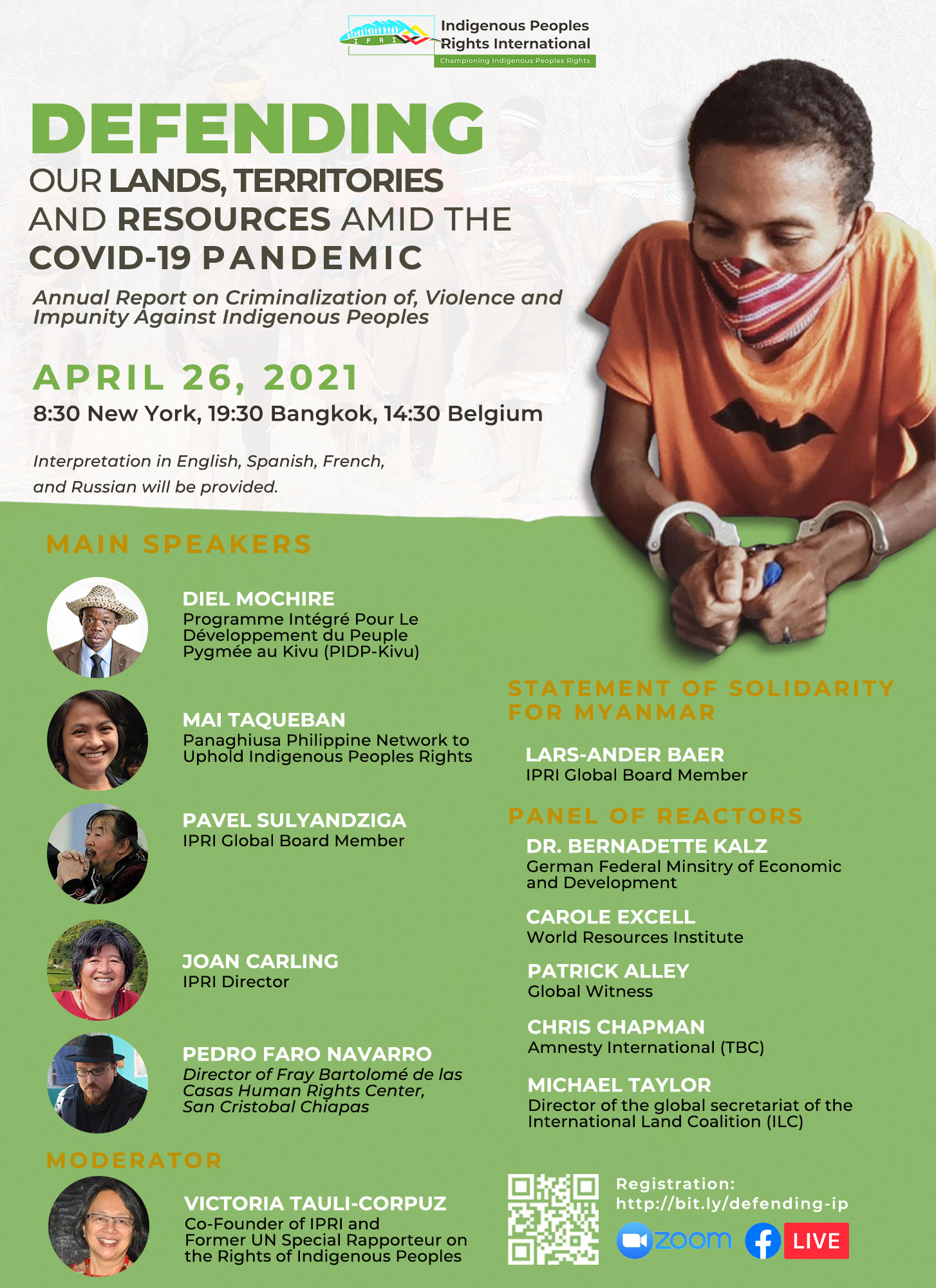
Annual Report on Criminalization of and Impunity Against Indigenous Peoples: Defending Our Lands, Territories and Resources amid the COVID-19 Pandemic
Background and Objectives
In light of this year’s theme of the role of Indigenous Peoples in implementing Sustainable Development Goal 16: Peace, Justice and Strong Institutions, Indigenous Peoples Rights International (IPRI) will present the “Annual Report on Criminalization of and Impunity Against Indigenous Peoples: Defending Our Lands, Territories and Resources amid the COVID-19 Pandemic.” This Annual Report is based mainly on the stories of IPRI’s six focus countries: The Democratic Republic of Congo (DRC), Brazil, Colombia, Mexico, India and the Philippines. The report describes the nuances of the strategies and actions against Indigenous Peoples.
We take this as an opportunity to highlight and raise awareness of the growing trend of criminalization and violence against Indigenous Peoples. We also aim to build broader solidarity and generate actions for justice and respect for Indigenous Peoples’ rights.
In 2019, Indigenous Peoples Rights International was established to oversee the Global Initiative to Address and Prevent Criminalization, Violence and Impunity Against Indigenous Peoples (Global Initiative). Through the Global Initiative, we aim for Indigenous Peoples, movements and support organizations to collectively address the global crisis of attacks against Indigenous Peoples human rights defenders. A core component of the Global Initiative is monitoring and reporting the incidents of criminalization of, violence, and impunity against Indigenous Peoples.
In addition to the growing trend of attacks against Indigenous Peoples human rights defenders, the year 2020 included the abuse of laws and policies to “address” the impacts of the pandemic. These measures included loosening environmental and social safeguards for various industries, particularly extractive industries. In various cases, these undermined and attacked the human rights and fundamental freedoms of Indigenous Peoples.
Speakers
Diel Mochire | Programme Intégré Pour Le Développement du Peuple Pygmée au Kivu (PIDP-Kivu) (Democratic Republic of Congo)
Indigenous Pygmy peoples’ rights defender, Programme Intégré Pour Le Développement du Peuple Pygmée au Kivu (PIDP-Kivu). Expert at the United Nations Voluntary Fund for Indigenous Peoples. DRC National Coordinator of Indigenous Peoples Rights International (IPRI). (Democratic Republic of Congo)
Mai Taqueban | Panaghiusa Philippine Network to Uphold Indigenous Peoples Rights (Philippines)
Philippine Network to Uphold Indigenous Peoples Rights. Member of the Global Campaign and the Treaty Alliance, Executive Director of Legal Rights and Natural Resources Center-Friends of the Earth Philippines. (Philippines)
Pavel Sulyandziga | IPRI Global Board Member (Arctic)
IPRI Board Member. Former member of the United Nations Working Group on Business and Human Rights. Former first vice-president of the Russian Association of Indigenous Peoples of the North (RAIPON), and former member of the United Nations Permanent Forum on Indigenous Issues. He is now the president of the International Indigenous Fund for Development and Solidarity (“Batani”) (Arctic)
Constantino Rubén Moreno Méndez | Coordinator of the Advocady Department of Fray Bartolome de las Casas Center (México)
Introduction and Overview
Joan Carling | Director Indigenous Peoples Rights International (Philippines)
Director Indigenous Peoples Rights International. General Secretary of the Asia Indigenous People Pact (AIPP) 2008-2016. Member of the Permanent Forum on Indigenous Issues (2014-2016). Co-convenor of the Indigenous Peoples’ Major Group for Sustainable Development-IPMG.
Statement of Solidarity for Myanmar
Lars-Ander Baer
IPRI Global Board Member
Member of IPRI Global Board. Lars is a Saami and reindeer herder from Sweden. He served as the president of the Saami Parliament in Sweden in 2001 and chairperson of the Union of the Swedish Saami (Svenska Samernas Riksforund, SSR) from 1993 to 2001.
Panel of Reactors
Dr. Bernadette Kalz
German Federal Ministry of Economic and Development
Works on the rights of indigenous peoples in the unit on Human Rights, Gender and Inclusion at the German Federal Ministry of Economic Cooperation and Development. She worked in Mexico and Peru on indigenous and human rights issues. (GIZ)
Carole Excell
World Resources Institute
Environmental rights and legal expert in various regions promoting environmental rights and democracy with a special focus on inclusive and equitable development and support for increasing civil space and protection of environmental and land defenders. Director for the Environmental Democracy Practice in the Governance Center of Excellence at the World Resources Institute (WRI)
Patrick Alley
Global Witness
Director and Co-founder of Global Witness. Patrick has taken part in over fifty field investigations in South East Asia, Africa and Europe and in subsequent advocacy activities. Patrick conceived several of Global Witness’ campaigns and focuses on corruption, conflict resources, forests and land & environmental defenders. Patrick is a trustee of the OpenCorporates Trust Limited and on the advisory groups of Indigenous Peoples Rights International and Climate Counsel. (Global Witness)
Chris Chapman
Amnesty International (TBC)
Michael Taylor
Director of the global secretariat of the International Land Coalition (ILC)
Michael Taylor is the Director of the global secretariat of the International Land Coalition (ILC). ILC is hosted by the International Fund for Agricultural Development (IFAD), a UN Agency in Rome, Italy. Michael is a citizen of Botswana, with a PhD in Social Anthropology. He has worked on human rights and environmental issues for 30 years across Africa and the rest of the world. The International Land Coalition is a global alliance of 250 multilateral and civil society organizations based in 78 countries. Its members represent over 70 Million land-users across the globe.
Moderator
Vicky Tauli-Corpuz
Co-Founder of IPRI and Former UN Special Rapporteur on the Rights of Indigenous Peoples
Co-Founder of IPRI. Indigenous activist from the Kankana-ey Igorot people of the Cordillera Region in the Philippines. Former chairperson of the United Nations Permanent Forum on Indigenous Issues and UN Special Rapporteur on the Rights of Indigenous Peoples from 2014 to 2020.

